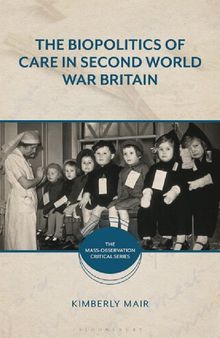دانلود کتاب The Biopolitics of Care in Second World War Britain
by Kimberly Mair|
|
عنوان فارسی: بیوپولیتیک مراقبت در جنگ جهانی دوم بریتانیا |
 دانلود کتاب
دانلود کتاب
 جزییات کتاب
جزییات کتاب
Kimberly Mair looks at how government publicity campaigns communicated new instructions for care formally, while the circulation of wartime rumours negotiated these instructions informally. These rumours, she argues, explicitly repudiated the improper socialization of evacuees and also produced a salient, but contested, image of the host as a good wartime citizen who was impervious to the cultural invasion of the ostensibly ‘animalistic’, dirty, and destructive house guest. Mair also considers the explicit contestations over the value of the lives of pets, conceived as animals who do not work with animal caregivers whose use of limited provisions or personal sacrifice could then be judged in the context of wartime hardship.
Together, formal and informal instructions for caregiving reshaped everyday habits in the war years to an idealized template of the good citizen committed to the war and nation, with Mass-Observation enacting a watchful form of care by surveilling civilian feeling and habit in the process.
How are norms of care tied to conceptions of good citizens, matters of population security and the evaluation of worthy life? This book looks to the crisis of World War II in Britain, when official Air Raid Precautions made the management of ordinary, daily life a moral obligation of civil defence by introducing new prescriptions for the care of homes, animals and persons displaced through evacuation. Government publicity campaigns and instructional brochures communicated new instructions for care formally, while the circulation of wartime rumours and gossip negotiated these instructions informally. Together, formal and informal instructions for caregiving reshaped everyday habits during wartime and supported the construction of a responsible and good social subject committed to the war effort specifically and to the population’s interests generally. Mass Observation played multiple roles as investigator, mediator and agent in this complex arrangement, but with a critical difference: Mass Observation also targeted politicians and decision-makers to foster more compassionate forms of governance during the war. From its inception in 1937, Mass Observation mobilized a participatory movement dedicated to the study of everyday life and the mapping of public feelings, animated by its founders’ vision for a dynamic public sphere. During the war, Mass Observation studied in minute detail the shifting beliefs and practices that enable the tracing of shifting norms of care for homes, animals and displaced persons. Making its own critical interventions into public discourse, as well as exerting its influence upon the Ministry of Information’s Home Intelligence division’s surveillance and management of public feeling, Mass Observation often reversed the direction of the imperative logics that organized civil defence, asking those who occupied positions of power to do what it asked of the people: to listen and to keep a good heart.





 این کتاب رو مطالعه کردید؟ نظر شما چیست؟
این کتاب رو مطالعه کردید؟ نظر شما چیست؟
